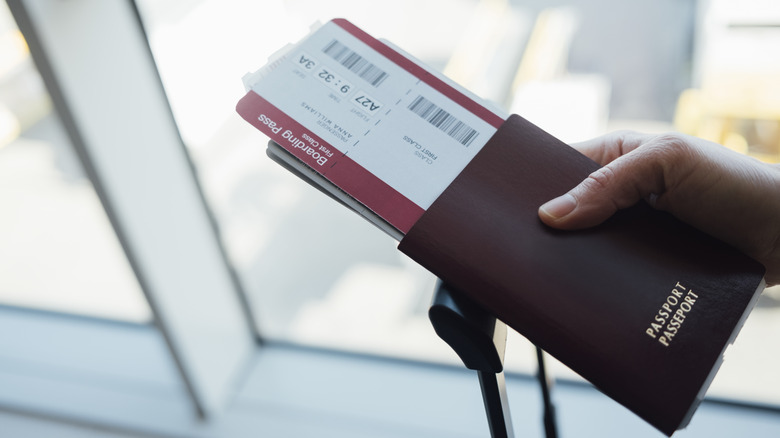The Dangerous Reason To Stop Throwing Away Your Old Boarding Passes
Now part of a travel norm, mobile boarding passes were introduced to consumers in 2007. Tucked safely away in your phone, you no longer needed to keep track of a long boarding ticket while you hustled to your airport gate. That's a relief, especially to folks trying to make a connection at the busiest airport in the world. Yet not all travelers use mobile boarding passes, so what's to be done with the paper ticket when the travel is over? Do you toss it in the nearest trash can? You shouldn't, because it's not safe.
Some travelers keep their boarding passes as a souvenir. They frame or put them in a scrapbook with photos or other tickets from their adventure. Yet more practical travelers have different reasons for not parting with their passes immediately. It's a good idea to hold on to them for at least a few weeks post-travel in case something goes wrong, like missing miles from your frequent flier account, for example.
While some carriers like Alaska Airlines have made headlines in the last few years for phasing out boarding pass printing kiosks to further normalize digital versions, not everyone will use them. Some experts even say it's best to print your boarding pass instead. So, if you're a printed pass passenger, always remember to dispose of your ticket safely after your adventure primarily because of the information they contain.
Boarding passes hold sensitive information
Boarding passes are much more than just tickets for your flight. In fact, they contain enough personal information to allow criminals to make your life difficult — especially if they utilize a QR or barcode reader. Karsten Nohl and Nemanja Nikodijevic, two security experts, told Business Traveller that a person's booking code can often be used as a temporary password, so that is a primary reason to not only keep a boarding pass but also protect it.
"You would imagine that if they treat it as a password equivalent then they would keep it secret like a password," Nohl told the outlet. "Only, they don't, but rather print it on everything you get from the airline." That's why, besides not just throwing it away whole, it's good practice not to post unobstructed photos of a boarding pass online, either. Anyone with access to a scanner can scan your pass and access your travel information and potentially a few digits of the card number you used to book the flight.
Some scammers could even use the private information to access your frequent flier account with the airline. Could you imagine someone popping into a legacy account, changing the password, and having access to those hard-earned miles? And you thought getting the dreaded SSSS on your boarding pass was the worst that could happen.
How to safely dispose of a boarding pass
Like any other sensitive document, a boarding pass must be disposed of with caution. Rather than tossing it in the nearest garbage can after landing, hold on to it until you can ensure it cannot be used by someone nefarious. That means taking extra care to shred, mark up, or otherwise make the document unreadable/unusable.
"The next time you're thinking of throwing away a used boarding pass with a barcode on it, consider tossing the boarding pass into a document shredder instead," Brian Krebs, a cybersecurity expert, told Inc. "Two-dimensional barcodes and QR codes can hold a great deal of information, and the codes printed on airline boarding passes may allow someone to discover more about you, your future travel plans, and your frequent flyer account."
Beyond throwing them away, Krebs warns on his own site to be wary of posting images of boarding passes on social media. Not only could someone infiltrate the barcode for your personal information, but also because social media makes easy pickings of your security questions. It just takes a quick glance to find family members, favorite pets, or where you were born, after all.


